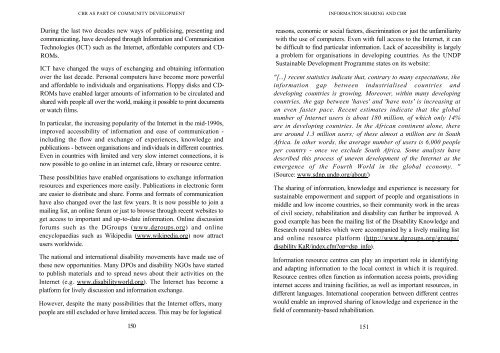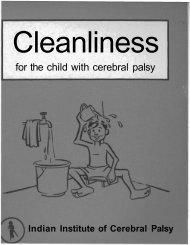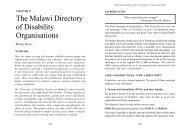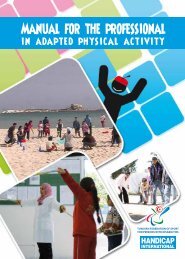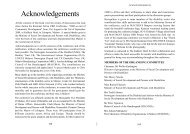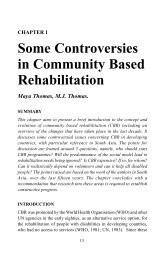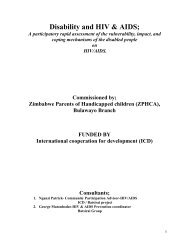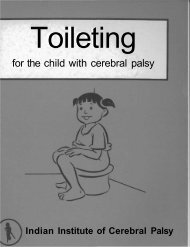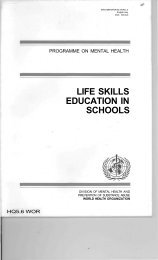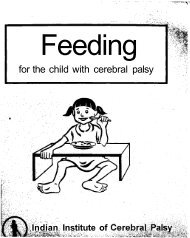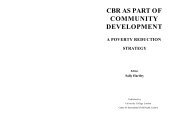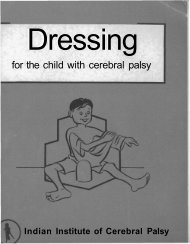Information sharing and community-based rehabilitation - Source
Information sharing and community-based rehabilitation - Source
Information sharing and community-based rehabilitation - Source
You also want an ePaper? Increase the reach of your titles
YUMPU automatically turns print PDFs into web optimized ePapers that Google loves.
CBR AS PART OF COMMUNITY DEVELOPMENT<br />
INFORMATION SHARING AND CBR<br />
During the last two decades new ways of publicising, presenting <strong>and</strong><br />
communicating, have developed through <strong>Information</strong> <strong>and</strong> Communication<br />
Technologies (ICT) such as the Internet, affordable computers <strong>and</strong> CD-<br />
ROMs.<br />
ICT have changed the ways of exchanging <strong>and</strong> obtaining information<br />
over the last decade. Personal computers have become more powerful<br />
<strong>and</strong> affordable to individuals <strong>and</strong> organisations. Floppy disks <strong>and</strong> CD-<br />
ROMs have enabled larger amounts of information to be circulated <strong>and</strong><br />
shared with people all over the world, making it possible to print documents<br />
or watch films.<br />
In particular, the increasing popularity of the Internet in the mid-1990s,<br />
improved accessibility of information <strong>and</strong> ease of communication -<br />
including the flow <strong>and</strong> exchange of experiences, knowledge <strong>and</strong><br />
publications - between organisations <strong>and</strong> individuals in different countries.<br />
Even in countries with limited <strong>and</strong> very slow internet connections, it is<br />
now possible to go online in an internet cafe, library or resource centre.<br />
These possibilities have enabled organisations to exchange information<br />
resources <strong>and</strong> experiences more easily. Publications in electronic form<br />
are easier to distribute <strong>and</strong> share. Forms <strong>and</strong> formats of communication<br />
have also changed over the last few years. It is now possible to join a<br />
mailing list, an online forum or just to browse through recent websites to<br />
get access to important <strong>and</strong> up-to-date information. Online discussion<br />
forums such as the DGroups (www.dgroups.org) <strong>and</strong> online<br />
encyclopaedias such as Wikipedia (www.wikipedia.org) now attract<br />
users worldwide.<br />
The national <strong>and</strong> international disability movements have made use of<br />
these new opportunities. Many DPOs <strong>and</strong> disability NGOs have started<br />
to publish materials <strong>and</strong> to spread news about their activities on the<br />
Internet (e.g. www.disabilityworld.org). The Internet has become a<br />
platform for lively discussion <strong>and</strong> information exchange.<br />
However, despite the many possibilities that the Internet offers, many<br />
people are still excluded or have limited access. This may be for logistical<br />
150<br />
reasons, economic or social factors, discrimination or just the unfamiliarity<br />
with the use of computers. Even with full access to the Internet, it can<br />
be difficult to find particular information. Lack of accessibility is largely<br />
a problem for organisations in developing countries. As the UNDP<br />
Sustainable Development Programme states on its website:<br />
"[...] recent statistics indicate that, contrary to many expectations, the<br />
information gap between industrialised countries <strong>and</strong><br />
developing countries is growing. Moreover, within many developing<br />
countries, the gap between 'haves' <strong>and</strong> 'have nots' is increasing at<br />
an even faster pace. Recent estimates indicate that the global<br />
number of Internet users is about 180 million, of which only 14%<br />
are in developing countries. In the African continent alone, there<br />
are around 1.3 million users; of these almost a million are in South<br />
Africa. In other words, the average number of users is 6,000 people<br />
per country - once we exclude South Africa. Some analysts have<br />
described this process of uneven development of the Internet as the<br />
emergence of the Fourth World in the global economy. "<br />
(<strong>Source</strong>: www.sdnp.undp.org/about/)<br />
The <strong>sharing</strong> of information, knowledge <strong>and</strong> experience is necessary for<br />
sustainable empowerment <strong>and</strong> support of people <strong>and</strong> organisations in<br />
middle <strong>and</strong> low income countries, so their <strong>community</strong> work in the areas<br />
of civil society, <strong>rehabilitation</strong> <strong>and</strong> disability can further be improved. A<br />
good example has been the mailing list of the Disability Knowledge <strong>and</strong><br />
Research round tables which were accompanied by a lively mailing list<br />
<strong>and</strong> online resource platform (http://www.dgroups.org/groups/<br />
disability KaR/index.cfm?op=dsp_info).<br />
<strong>Information</strong> resource centres can play an important role in identifying<br />
<strong>and</strong> adapting information to the local context in which it is required.<br />
Resource centres often function as information access points, providing<br />
internet access <strong>and</strong> training facilities, as well as important resources, in<br />
different languages. International cooperation between different centres<br />
would enable an improved <strong>sharing</strong> of knowledge <strong>and</strong> experience in the<br />
field of <strong>community</strong>-<strong>based</strong> <strong>rehabilitation</strong>.<br />
151


